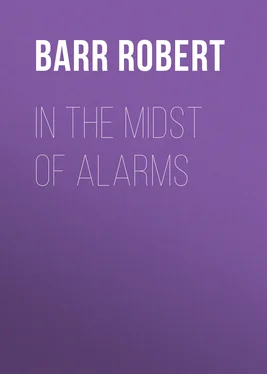Robert Barr - In the Midst of Alarms
Здесь есть возможность читать онлайн «Robert Barr - In the Midst of Alarms» — ознакомительный отрывок электронной книги совершенно бесплатно, а после прочтения отрывка купить полную версию. В некоторых случаях можно слушать аудио, скачать через торрент в формате fb2 и присутствует краткое содержание. Жанр: foreign_prose, foreign_antique, на английском языке. Описание произведения, (предисловие) а так же отзывы посетителей доступны на портале библиотеки ЛибКат.
- Название:In the Midst of Alarms
- Автор:
- Жанр:
- Год:неизвестен
- ISBN:нет данных
- Рейтинг книги:4 / 5. Голосов: 1
-
Избранное:Добавить в избранное
- Отзывы:
-
Ваша оценка:
- 80
- 1
- 2
- 3
- 4
- 5
In the Midst of Alarms: краткое содержание, описание и аннотация
Предлагаем к чтению аннотацию, описание, краткое содержание или предисловие (зависит от того, что написал сам автор книги «In the Midst of Alarms»). Если вы не нашли необходимую информацию о книге — напишите в комментариях, мы постараемся отыскать её.
In the Midst of Alarms — читать онлайн ознакомительный отрывок
Ниже представлен текст книги, разбитый по страницам. Система сохранения места последней прочитанной страницы, позволяет с удобством читать онлайн бесплатно книгу «In the Midst of Alarms», без необходимости каждый раз заново искать на чём Вы остановились. Поставьте закладку, и сможете в любой момент перейти на страницу, на которой закончили чтение.
Интервал:
Закладка:
“And this is my daughter,” continued the good woman. “Now, what might your names be?”
“My name is Yates, and this is my friend Professor Renmark of T’ronto,” pronouncing the name of the fair city in two syllables, as is, alas! too often done. The professor bowed, and Yates cordially extended his hand to the young woman. “How do you do, Miss Bartlett?” he said, “I am happy to meet you.”
The girl smiled very prettily, and said she hoped they had a pleasant trip out from Fort Erie.
“Oh, we had,” said Yates, looking for a moment at his host, whose eyes were fixed on the tablecloth, and who appeared to be quite content to let his wife run the show. “The road’s a little rocky in places, but it’s very pleasant.”
“Now, you sit down here, and you here,” said Mrs. Bartlett; “and I do hope you have brought good appetites with you.”
The strangers took their places, and Yates had a chance to look at the younger member of the family, which opportunity he did not let slip. It was hard to believe that she was the daughter of so crusty a man as Hiram Bartlett. Her cheeks were rosy, with dimples in them that constantly came and went in her incessant efforts to keep from laughing. Her hair, which hung about her plump shoulders, was a lovely golden brown. Although her dress was of the cheapest material, it was neatly cut and fitted; and her dainty white apron added that touch of wholesome cleanliness which was so noticeable everywhere in the house. A bit of blue ribbon at her white throat, and a pretty spring flower just below it, completed a charming picture, which a more critical and less susceptible man than Yates might have contemplated with pleasure.
Miss Bartlett sat smilingly at one end of the table, and her father grimly at the other. The mother sat at the side, apparently looking on that position as one of vantage for commanding the whole field, and keeping her husband and her daughter both under her eye. The teapot and cups were set before the young woman. She did not pour out the tea at once, but seemed to be waiting instructions from her mother. That good lady was gazing with some sternness at her husband, he vainly endeavoring to look at the ceiling or anywhere but at her. He drew his open hand nervously down his face, which was of unusual gravity even for him. Finally he cast an appealing glance at his wife, who sat with her hands folded on her lap, but her eyes were unrelenting. After a moment’s hopeless irresolution Bartlett bent his head over his plate and murmured:
“For what we are about to receive, oh, make us truly thankful. Amen.”
Mrs. Bartlett echoed the last word, having also bowed her head when she saw surrender in the troubled eyes of her husband.
Now, it happened that Yates, who had seen nothing of this silent struggle of the eyes, being exceedingly hungry, was making every preparation for the energetic beginning of the meal. He had spent most of his life in hotels and New York boarding houses, so that if he ever knew the adage, “Grace before meat,” he had forgotten it. In the midst of his preparations came the devout words, and they came upon him as a stupefying surprise. Although naturally a resourceful man, he was not quick enough this time to cover his confusion. Miss Bartlett’s golden head was bowed, but out of the corner of her eye she saw Yates’ look of amazed bewilderment and his sudden halt of surprise. When all heads were raised, the young girl’s still remained where it was, while her plump shoulders quivered. Then she covered her face with her apron, and the silvery ripple of a laugh came like a smothered musical chime trickling through her fingers.
“Why, Kitty !” cried her mother in astonishment, “whatever is the matter with you?”
The girl could no longer restrain her mirth. “You’ll have to pour out the tea, mother!” She exclaimed, as she fled from the room.
“For the land’s sake!” cried the astonished mother, rising to take her frivolous daughter’s place, “what ails the child? I don’t see what there is to laugh at.”
Hiram scowled down the table, and was evidently also of the opinion that there was no occasion for mirth. The professor was equally in the dark.
“I am afraid, Mrs. Bartlett,” said Yates, “that I am the innocent cause of Miss Kitty’s mirth. You see, madam—it’s a pathetic thing to say, but really I have had no home life. Although I attend church regularly, of course,” he added with jaunty mendacity, “I must confess that I haven’t heard grace at meals for years and years, and—well, I wasn’t just prepared for it. I have no doubt I made an exhibition of myself, which your daughter was quick to see.”
“It wasn’t very polite,” said Mrs. Bartlett with some asperity.
“I know that,” pleaded Yates with contrition, “but I assure you it was unintentional on my part.”
“Bless the man!” cried his hostess. “I don’t mean you. I mean Kitty. But that girl never could keep her face straight. She always favored me more than her father.”
This statement was not difficult to believe, for Hiram at that moment looked as if he had never smiled in his life. He sat silent throughout the meal, but Mrs. Bartlett talked quite enough for two.
“Well, for my part,” she said, “I don’t know what farming’s coming to! Henry Howard and Margaret drove past here this afternoon as proud as Punch in their new covered buggy. Things is very different from what they was when I was a girl. Then a farmer’s daughter had to work. Now Margaret’s took her diploma at the ladies’ college, and Arthur he’s begun at the university, and Henry’s sporting round in a new buggy. They have a piano there, with the organ moved out into the back room.”
“The whole Howard lot’s a stuck-up set,” muttered the farmer.
But Mrs. Bartlett wouldn’t have that. Any detraction that was necessary she felt competent to supply, without help from the nominal head of the house.
“No, I don’t go so far as to say that. Neither would you, Hiram, if you hadn’t lost your lawsuit about the line fence; and served you right, too, for it wouldn’t have been begun if I had been at home at the time. Not but what Margaret’s a good housekeeper, for she wouldn’t be her mother’s daughter if she wasn’t that; but it does seem to me a queer way to raise farmers’ children, and I only hope they can keep it up. There were no pianos nor French and German in my young days.”
“You ought to hear her play! My lands!” cried young Bartlett, who spoke for the first time. His admiration for her accomplishment evidently went beyond his powers of expression.
Bartlett himself did not relish the turn the conversation had taken, and he looked somewhat uneasily at the two strangers. The professor’s countenance was open and frank, and he was listening with respectful interest to Mrs. Bartlett’s talk. Yates bent over his plate with flushed face, and confined himself strictly to the business in hand.
“I am glad,” said the professor innocently to Yates, “that you made the young lady’s acquaintance. I must ask you for an introduction.”
For once in his life Yates had nothing to say, but he looked at his friend with an expression that was not kindly. The latter, in answer to Mrs. Bartlett’s inquiries, told how they had passed Miss Howard on the road, and how Yates, with his usual kindness of heart, had offered the young woman the hospitalities of the hay rack. Two persons at the table were much relieved when the talk turned to the tent. It was young Hiram who brought about this boon. He was interested in the tent, and he wanted to know. Two things seemed to bother the boy: First, he was anxious to learn what diabolical cause had been at work to induce two apparently sane men to give up the comforts of home and live in this exposed manner, if they were not compelled to do so. Second, he desired to find out why people who had the privilege of living in large cities came of their own accord into the uninteresting country, anyhow. Even when explanations were offered, the problem seemed still beyond him.
Читать дальшеИнтервал:
Закладка:
Похожие книги на «In the Midst of Alarms»
Представляем Вашему вниманию похожие книги на «In the Midst of Alarms» списком для выбора. Мы отобрали схожую по названию и смыслу литературу в надежде предоставить читателям больше вариантов отыскать новые, интересные, ещё непрочитанные произведения.
Обсуждение, отзывы о книге «In the Midst of Alarms» и просто собственные мнения читателей. Оставьте ваши комментарии, напишите, что Вы думаете о произведении, его смысле или главных героях. Укажите что конкретно понравилось, а что нет, и почему Вы так считаете.












